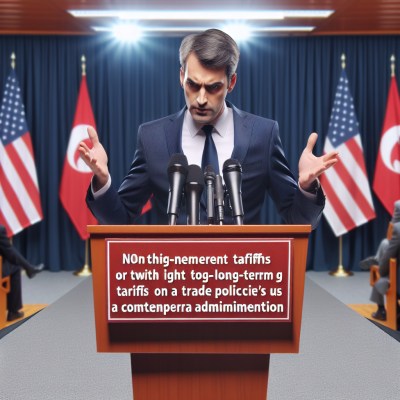
Sen. Ted Cruz Shares Concerns Over Long-Term Trump Tariffs on Mexico and Canada
The ongoing debates surrounding tariffs and trade policies took center stage once again as Texas Republican Sen. Ted Cruz expressed his reservations about the latest tariff decisions from the Trump administration. While acknowledging the need for strong economic policies, Cruz highlighted concerns regarding prolonged tariffs on Mexico and Canada.
So, what does this mean for businesses, consumers, and the U.S. economy? Let’s dive deeper into Cruz’s viewpoints and his proposed plan to eliminate taxes on tipped income.
Trump’s New Tariffs: A Cause for Concern?
The Trump administration has introduced fresh tariffs aimed at reshaping trade relationships. While tariffs can be a powerful tool for economic leverage, they often come with trade-offs that impact industries, businesses, and everyday consumers.
Sen. Cruz candidly addressed these latest tariff decisions, emphasizing that while he supports fair trade agreements, he does not want to see hefty tariffs imposed on Mexico and Canada for the long term. His concern is primarily focused on how such tariffs might affect businesses, especially in Texas, which shares a large border with Mexico and relies heavily on trade with both nations.
Why Does Cruz Oppose Long-Term Tariffs?
Cruz pointed to several key reasons for his opposition to prolonged tariffs:
- Economic Impact: Tariffs on Mexico and Canada could lead to higher costs for businesses that rely on imports from these countries, ultimately affecting American consumers.
- Potential Trade Tensions: Prolonged tariffs could strain trade relations with two of the United States’ largest trading partners.
- Effects on Texas: Given Texas’ geographic and economic ties to Mexico, long-term tariffs could hurt businesses that depend on cross-border trade.
While tariffs may serve as a short-term negotiating tool, Cruz believes sustained tariffs could do more harm than good for the American economy.
Cruz’s Plan to Eliminate Taxes on Tipped Income
Beyond trade tariffs, Cruz also took the opportunity to highlight another policy he’s pushing for—ending taxes on tips. This initiative aims to provide relief to service industry workers who rely heavily on tipped wages.
Why Does This Matter?
Many service industry employees, including restaurant workers, bartenders, and hotel staff, depend on tips as a significant part of their income. Currently, these tips are taxed, which can reduce take-home pay. Cruz argues that eliminating taxes on tips would:
- Provide more financial relief for low-income workers.
- Boost disposable income and spending power.
- Encourage job growth in the service industry.
This proposal could be particularly beneficial for hospitality workers as they often earn below the standard minimum wage, depending on tips to make a living wage.
What’s Next for Tariffs and the Tipping Tax Policy?
As the Trump administration continues to push forward with its economic policies, debates around tariffs and taxation will likely remain in focus. Cruz’s opposition to long-term tariffs suggests that Republican lawmakers may still be divided on the best approach to trade with Mexico and Canada.
Similarly, his plan to eliminate taxes on tips could become a key policy discussion, especially as lawmakers consider various measures to provide financial relief to American workers.
The Bottom Line
Sen. Ted Cruz’s recent statements reflect an ongoing need to balance economic protectionism with fair trade policies. While he supports strong trade agreements, he believes sustained tariffs on Mexico and Canada could backfire. Meanwhile, his proposal to eliminate taxes on tips aims to put more money in the pockets of service industry workers.
As these policies unfold, it will be essential to monitor how legislative decisions impact businesses, workers, and consumers across the country. Stay tuned for more updates on these pressing economic issues.


Leave a Reply